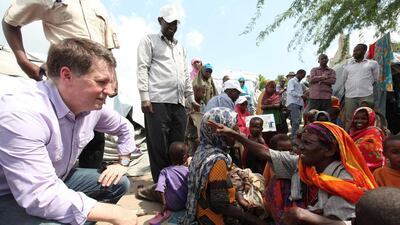Questions are being raised over whether British charity Save the Children should receive government funding after a damning report by the UK’s charity watchdog found it let down women who had made sexual harassment claims.
The Charity Commission said there were “serious weaknesses” in the way Save the Children handled the claims of harassment and inappropriate behaviour against senior members of staff.
Several women complained in 2012 and 2015 of misconduct by the then Save the Children chief executive Justin Forsyth and another senior staff member, Brendan Cox.
When the Commission launched the statutory inquiry in 2018 the charity voluntarily agreed to stop seeking British aid funding from the Department for International Development (Dfid).
Its chief executive Kevin Watkins had said the suspension of bids would last until the Secretary of State, which is now Anne-Marie Trevelyon, was satisfied that the charity was upholding the standards expected by Dfid.
However, this may not be anytime soon as one member of the international development committee, Pauline Latham, has called on Mr Watkins resignation.
She is calling for a report into its fitness to receive funding following the findings.
Mrs Latham told The National: "I'm pleased the Charity Commission has produced its report which is extremely damning of Save the Children. As a result I have little faith in the CEO because he was around when the problems were at their height.
“I believe that Save the Children need a new broom before the relaxation. I will be asking the committee to do a report as a follow up to our previous report some time ago.”
Mr Watkins was a trustee at the time of the allegations and it was revealed he spent £114,000 of charity funding on lawyers to try and prevent reports of the inappropriate behaviour being published in the media.
A Dfid source told The National that decisions on Save the Children's funding relationship with the UK Government will be made in due course.
“We have a zero tolerance approach to sexual harassment and bullying in any organisation,” a Dfid spokesperson said.
“We welcome the Charity Commission’s statutory inquiry into Save the Children and will work closely with both organisations to consider the findings and actions that need to be taken.”
Save the Children told The National it will be meeting with Dfid in the next few weeks.
“Whilst the Commission recognised that we have made significant progress in strengthening our office culture, we are determined that this remains a critical priority for our organisation,” it said.
“Our funding pause does not automatically end with the inquiry publication, so we will be discussing the status of the withdrawal with Dfid in the coming weeks.”
Save the Children’s latest accounts show a drop in its annual income of more than £100m and it estimates £16m was due to the withdrawal of Dfid funding.
In the Charity Commission’s report, which it published on Thursday, it said the organisation was evasive and unduly defensive in its response and made misleading public statements.
Save the Children also failed to inform Unicef about the allegations against Mr Forsyth before he took a job at the UN agency. He resigned from Unicef in 2018 after the earlier allegations became public.
"Save the Children UK let complainants and the public down. It must work hard now to rebuild its reputation,” said the watchdog’s chief executive, Helen Stephenson.
“Charities should be distinct from other types of organisations in their attitude and behaviour, in their motivations and methods. The public rightly expect that; so do the majority of people working in charities, who deserve a workplace culture that is healthy, supportive, and safe.
“Creating that culture is not just about putting the right systems and processes in place; it also requires leaders who model the highest standards of behaviour and conduct, and who are held to account properly and consistently when they fall short.”
Save the Children has said it "accepted in full" the findings, and has apologised to the women affected.


